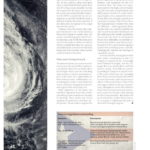2017 saw an unprecedented weather pattern, in the form of Atlantic Ocean hurricanes, which disrupted supply chains on land and at sea. These upheavals focused all eyes on the future of the Jones Act – a nearly 100 year old set of regulations. By Barry Parker
In normal times, maritime trade between U.S. ports (including Alaska and Hawaii, but also Puerto Rico) is reserved for »Jones[ds_preview] Act qualified« vessels built in U.S. yards, owned by U.S. interests, and crewed by U.S. mariners. However, in times of unusual circumstances – such as hurricanes and other natural disasters, the U.S. Department of Homeland Security is permitted to waive the Jones Act, thereby allowing non Jones Act vessels into specified trades. The legalities of waivers are highly complex, and are subject to interpretation.
In 2017, three waivers were issued. The disruption of the tanker trades by Hurricane Harvey (late August) and Hurricane Irma (early September) brought about two waivers (issued Sept 8th and 11th), while the need to move supplies to Puerto Rico after Hurricane Maria brought about a third waiver (issued Sept 28th). In all three cases, the waivers’ timeframes were temporary, their durations ranged from 7 to 11 days.
The events are all history now, the waivers have expired. The conditions giving rise to the first two waivers (related to movement of refined oil products on tankers) no longer exist. Refineries in Texas have re-opened, landside pipeline movements have resumed, and vessels no longer sheltering from storms are back on their normal voyage routings.
The deleterious situation with Puerto Rico, in contrast, is ongoing, with a painfully slow process of returning to normalcy; there are also questions about the actual legality of the Sept 28th waiver, which was only issued after extreme political pressure was placed on the Trump administration. Lawyer Charlie Papavizas, Partner at Winston & Strawn, explains the difference among waivers, telling HANSA: »The period of time type general waivers – which really started with Hurricane Katrina in 2005 – have mostly focused on the movement of petroleum products. Similar waivers were granted after Hurricanes Rita, Sandy and Harvey. The Hurricane Maria waiver followed that pattern, but covered all products, which I think is unprecedented.« And then, there is the tie to national security and safety, with Mr. Papavisas saying: »The only way to waive the Jones Act administratively, meaning other than by an Act of Congress, is via a 1950 law. That law requires that it be in the »interest of national defense« to waive the law (or any other navigation law).«
Another expert on Jones Act matters, Michael Cavanaugh, Partner in the Washington, D.C. office of Holland & Knight, expressed concerns about the legality of the waivers. He explained: »The statute, 46 U.S. Code §501 states waivers may only be granted in two situations: (1) On request of the Secretary of Defense, the Secretary of DHS »shall waive compliance with those laws to the extent the Secretary considers necessary in the interest of national defense.« Or (2) If the Secretary of DHS »considers it necessary in the interest of national defense.« The Secretary of DHS »following a determination by the Maritime Administrator…of the non-availability of qualified United States flag capacity to meet national defense requirements, may waive compliance with those laws to the extent, in the manner, and on the terms the individual, in consultation with the Administrator, acting in that capacity, prescribes.« We did not see any announcement by the Secretary of Defense which would have satisfied the first criteria.
Mr. Papavisas, from Winston & Strawn, offered his take on this aspect, adding: »The interesting thing about the Harvey and Maria waivers is that they were undertaken under the provision of the law that does not require a finding that no U.S.-flag vessel capacity is available for the movement or movements which must be done by MARAD. One can surmise that this was done because such a finding was not likely to be made.« Mr. Cavanaugh, from H &K, elaborated further: »When the acting DHS Secretary issued the Puerto Rico waiver, there was also no announcement that MARAD had made any finding of non-availability of U.S.-flag vessels. To the contrary, there were news reports that MARAD had found there were U.S.-flag vessels available. Section 501 requires the Secretary to announce the reasons for acting. Possibly some action by DOD occurred but was not announced, or possibly MARAD made a different finding than that reported. If not, there does not appear to be a legal basis for the waiver.«
Evidence from the market-place supports the lawyers’ view. As the drama in Puerto Rico began to unfold, Jones Act carriers mobilized quickly; both Crowley Maritime, and TOTE Maritime were active in the trades. Crowley was able to charter in additional Jones Act capacity, and additionally converted two flat deck barges into LoLo carriers, where trailers could be lashed to the deck.
What now? Going forward …
The humanitarian crisis, featured on television news for weeks following Hurricane Maria’s direct hit on Puerto Rico, has brought about cries for both long term waivers, as well as permanent repeal, of the Jones Act’s applicability to Puerto Rican trades. Additionally, in a recurring post-script to each temporary waiver, calls have emerged for a permanent repeal of the entire Jones Act.
Both supporters of the Jones Act and their opponents have their standard talking points honed over decades of sparring. These points are voiced regularly, by politicians and their media proxies. Those in favor support the maintaining of U.S. shipbuilding capacity, significant employment of yard workers, and manpower for the U.S. merchant fleet. The Jones Act opponents point to the high costs of freighting, due especially to shipbuilding costs well in excess of non U.S. yards, resulting in higher costs (compared to notional non Jones Act tonnage) passed on to consumers in places like Puerto Rico. The humanitarian wrinkles this time are different – with opponents blaming the Jones Act, and the inability for aid to reach the island’s inhabitants, for the suffering of the island’s population. Conversely, the Jones Act proponents blame these difficulties on landside infrastructure failures (and the poor performance of U.S. government agencies tasked with restoring power and distributing aid), and not on a shortage of »qualified« vessels.
As of late October, four legislative bills were under consideration in the U.S. Congress. A memo by Mr. Cavanaugh from Holland & Knight, and his colleague Eric Lee, details them, with the lawyers saying, »Four bills are currently pending in Congress to repeal or limit the reach of the Jones Act, including three that are focused upon relief efforts to assist Puerto Rico after the disastrous effects of Hurricane Maria. None of the bills appears likely to advance immediately, although two of the bills linked to Puerto Rico reconstruction may have appeal as part of a broader relief package for the Commonwealth.« The debate will go on, but politics (rather than economics or logistics) will dictate the path of these bills through Congress.
Barry Parker




















